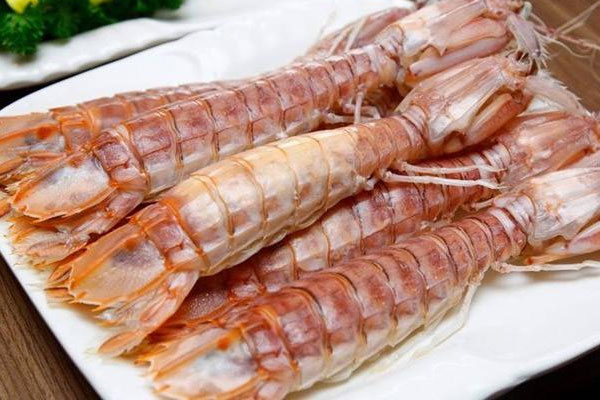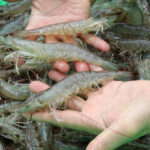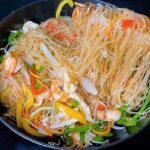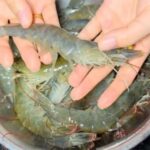– Fresh shrimp. Choose live shrimp that feel firm when held. Turn the shrimp over, and if you see a pinkish-red streak on the tail, these are the females carrying eggs.
– Spices: ginger, scallions, star anise, peppercorns, salt, and white rice wine.
Preparation:
– Rinse the shrimp thoroughly under running water. Soak them in a mixture of water and a small amount of rice wine for 20-30 minutes to eliminate any fishy odor.
– In a pot, add water, peppercorns, star anise, scallions, ginger, and salt. Arrange the shrimp in the pot. It’s important to use cold water when boiling shrimp; hot water will cause uneven cooking and result in tough, less juicy meat.
– Turn on the heat and boil the shrimp for approximately 3 minutes. Avoid overcooking, as this will dry out the shrimp and compromise their delicate flavor.
– 
– To eat, turn the shrimp over so their bellies face up. Using scissors, cut along the two rows of legs on either side. Then, peel off the shell, and you’ll easily be able to enjoy the tender shrimp meat.
– Dip the shrimp in chili sauce or a mixture of salt, pepper, lime juice, and mustard for an explosion of flavors.
– Enjoy!
*Source: Life & Law*
The Secret to Perfectly Cooked Shrimp: Unlocking the Key to Succulent, Flavorful, and Vibrant Shrimp
With this mouth-watering shrimp recipe, you’ll be treated to a delicious and memorable dining experience. The shrimp are cooked to perfection, resulting in a dish that’s packed with flavor and a texture that’s hard to forget. This dish is a true delight for seafood lovers, and one that will leave you craving more.
Deadly Shrimp Eating Mistakes You Might Be Making
Making these big mistakes when eating shrimp can be harmful: assuming that shrimp shells are a rich source of calcium, that eating shrimp heads is good for your eyesight, or that women should avoid eating shrimp after giving birth. It’s also important to note that you shouldn’t eat shrimp if you have a cough. Learn from this article to understand the common misconceptions and discover the right way to eat shrimp.





































